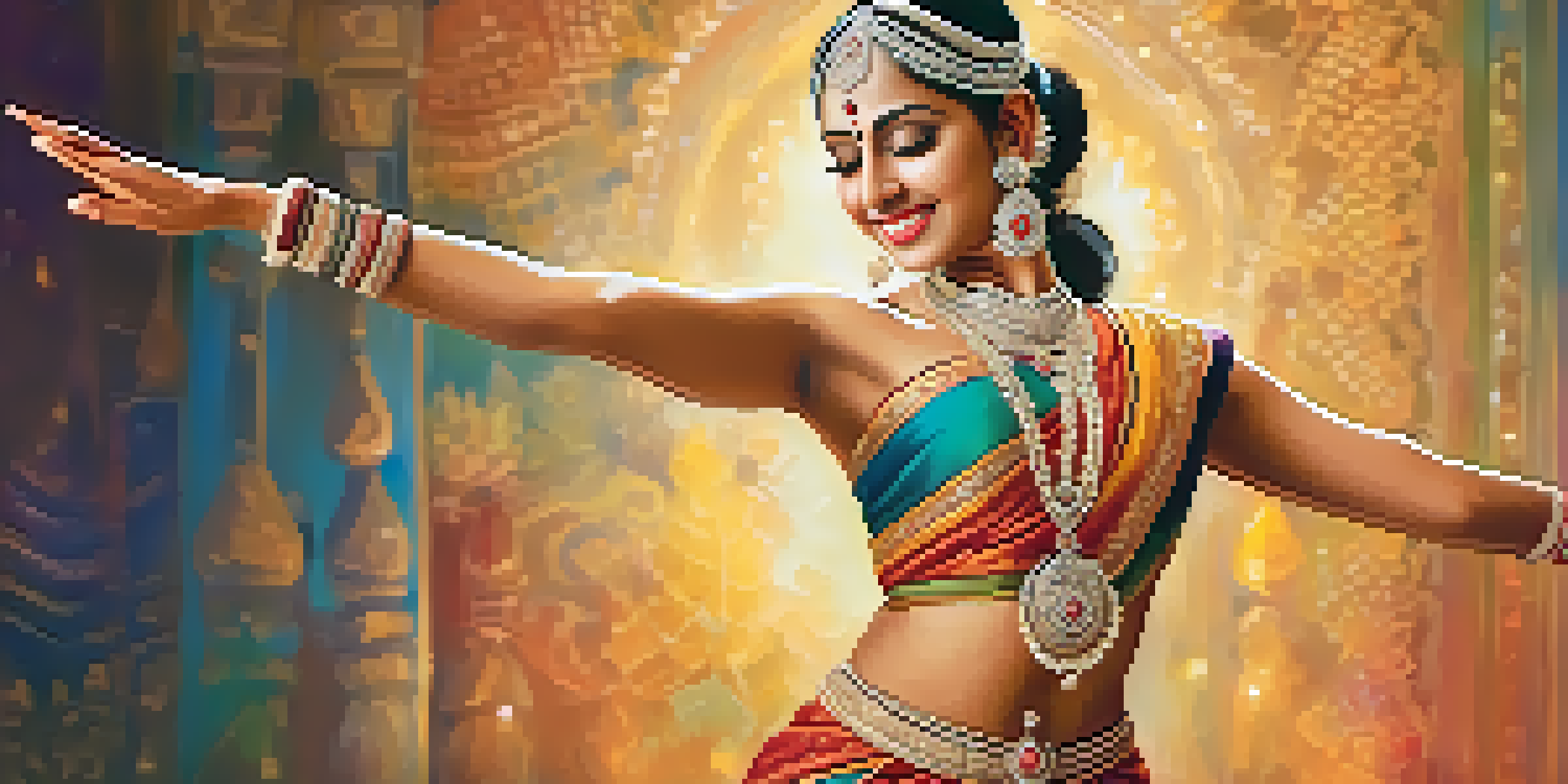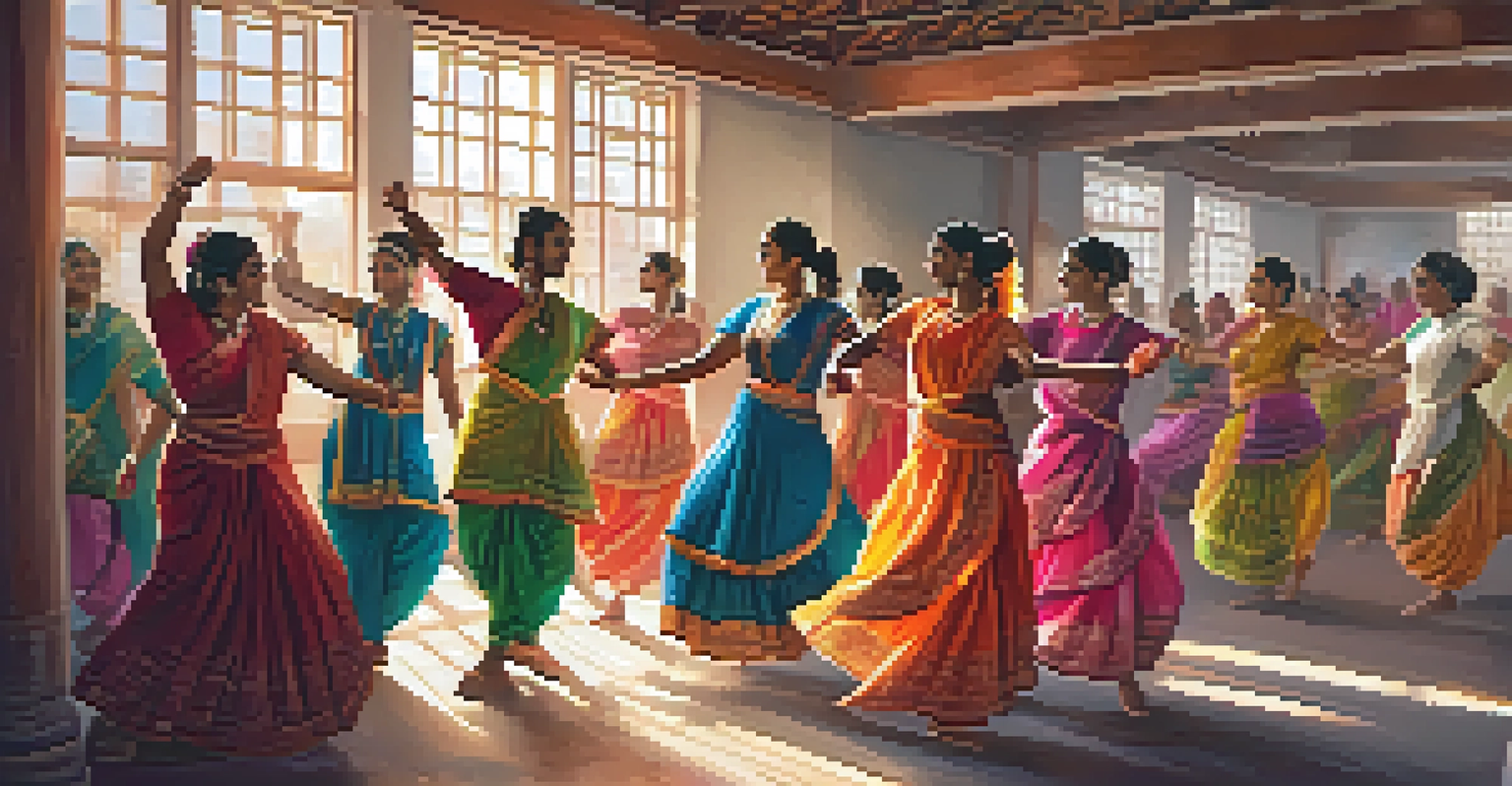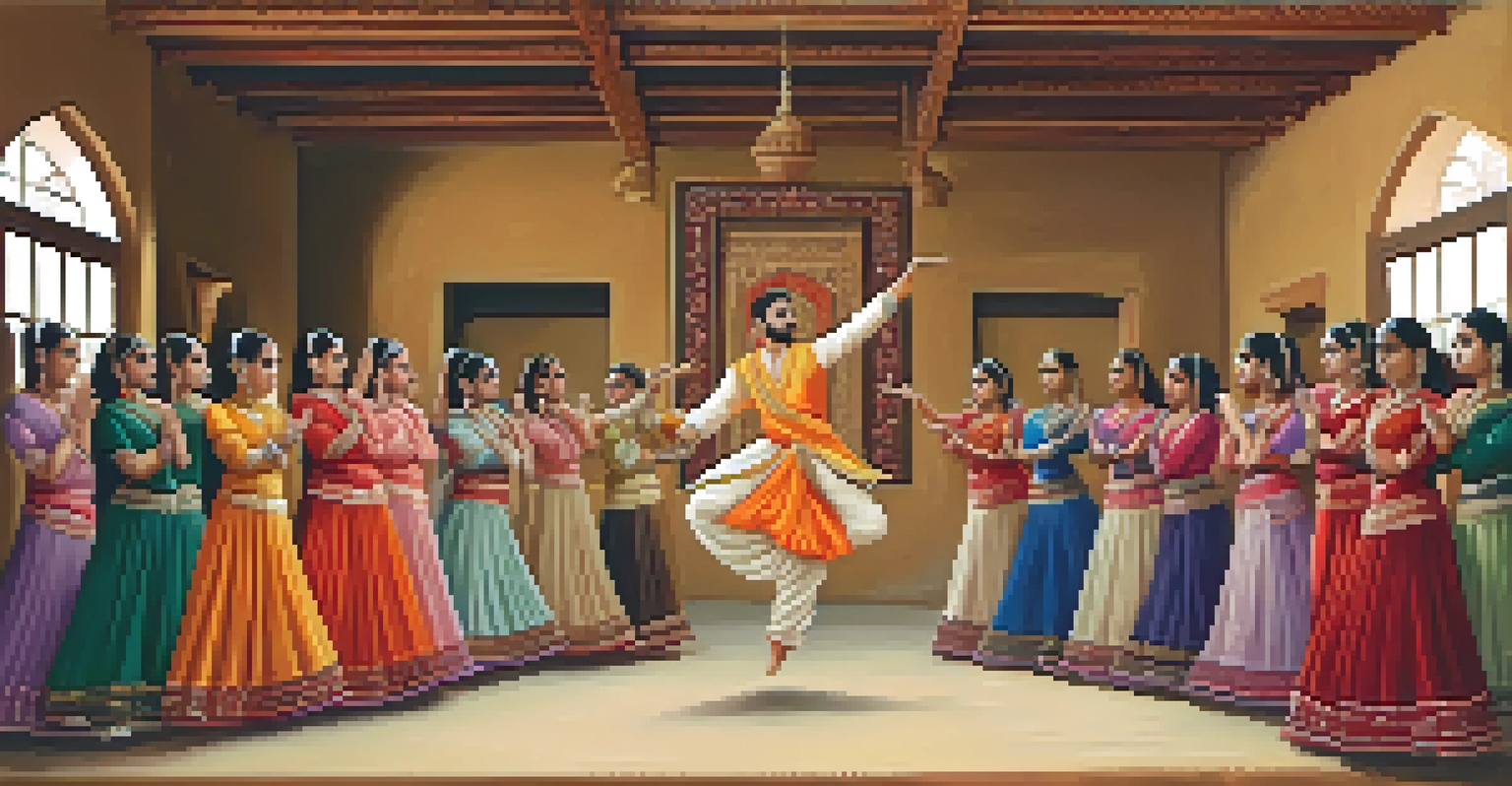Participating in Workshops of Traditional Indian Dance Forms

Understanding Traditional Indian Dance Forms
Traditional Indian dance forms are rich in history and culture, often telling stories through intricate movements. Each style, whether it's Bharatanatyam, Kathak, or Odissi, has its unique techniques and expressions. These dance forms are not just about physical activity; they're a way of connecting with India's diverse heritage and spirituality.
Dance is the hidden language of the soul.
For example, Bharatanatyam, with its origins in Tamil Nadu, emphasizes expressive hand gestures known as mudras. These gestures convey emotions and narratives, making every performance a captivating experience. Engaging in these dances allows participants to appreciate the depth and artistry involved, fostering a deeper connection to Indian culture.
Moreover, workshops often provide an immersive experience, helping participants understand the cultural context behind each dance. This knowledge enhances the practice, making it more meaningful. Whether you're a beginner or have some experience, these workshops offer a chance to dive into the world of Indian dance.
Benefits of Participating in Dance Workshops
Joining a traditional Indian dance workshop offers numerous benefits, both physically and mentally. Dance is a fantastic form of exercise, improving flexibility, strength, and coordination. Regular practice can also enhance cardiovascular health, making it a fun way to stay fit while enjoying the art.

Beyond the physical aspects, dance workshops foster mental well-being. Engaging in creative expression through movement can reduce stress and anxiety, offering a therapeutic escape from daily life. Participants often find that immersing themselves in dance helps elevate their mood and boost overall happiness.
Cultural Connection Through Dance
Traditional Indian dance workshops allow participants to engage with rich cultural heritage and storytelling.
Additionally, these workshops provide a sense of community. Meeting like-minded individuals who share a passion for dance creates lasting friendships and support networks. This social aspect can enrich the experience, making it more enjoyable and fulfilling.
What to Expect in a Dance Workshop
When you sign up for a traditional Indian dance workshop, you can expect a warm and welcoming environment. Most workshops start with a brief introduction to the style you'll be learning, often accompanied by insights into its historical significance. This context sets the stage for a more enriching experience as you begin to practice.
To watch us dance is to hear our hearts speak.
Typically, the sessions include a mix of warm-ups, technique training, and choreography. Instructors often break down complex movements into simpler steps, making it easier for participants to grasp. With patience and personalized attention, even beginners can feel accomplished as they progress through the lessons.
Moreover, many workshops incorporate live music, enhancing the overall experience. The rhythm and melody of traditional instruments like the tabla or flute add a magical element, allowing participants to connect more deeply with the dance. This holistic approach makes every session an engaging and joyful event.
Choosing the Right Workshop for You
With so many traditional Indian dance workshops available, choosing the right one can feel overwhelming. Start by identifying which dance form resonates with you the most. Each style has its own unique flair and emotional expression, so it's essential to find one that excites you.
Consider the level of expertise you're seeking as well. Some workshops cater specifically to beginners, while others might focus on advanced techniques. Reading reviews or asking for recommendations can guide you toward the right fit, ensuring you have a positive learning experience.
Physical and Mental Benefits
Participating in dance workshops improves physical fitness while also enhancing mental well-being and reducing stress.
Lastly, think about the location and schedule of the workshop. Finding a class that fits your timetable can make it easier to commit. Many dance studios also offer online classes, providing flexibility for those with busy schedules. This way, you can immerse yourself in the world of dance without added stress.
Overcoming Common Fears and Hesitations
It's natural to feel apprehensive about joining a dance workshop, especially if you have little to no experience. Many individuals worry about not being 'good enough' or feeling out of place among more skilled dancers. However, it's important to remember that everyone starts somewhere, and workshops are designed to be supportive environments.
One effective way to overcome these fears is to focus on the joy of learning rather than perfection. Dance is a form of self-expression, and the goal is to enjoy the process. Embracing this mindset can make your workshop experience much more rewarding and liberating.
Additionally, instructors are typically understanding and encouraging, helping to alleviate any anxiety. They create a positive atmosphere that celebrates progress and effort. By taking that initial step to participate, you'll likely discover a newfound sense of confidence and joy in dancing.
The Cultural Significance of Indian Dance
Participating in traditional Indian dance workshops allows individuals to engage with the cultural significance of these art forms. Historically, dance has been an integral part of Indian rituals, festivals, and celebrations. By learning these dances, participants become a part of a rich legacy that has been passed down through generations.
For example, many dances have religious or spiritual connotations, often performed in temples or during festivals. Understanding the cultural context of these dances adds depth to your practice, as you realize that you are honoring traditions that have shaped communities for centuries.
Building Skills Beyond Dance
Dance workshops foster valuable skills like memory, discipline, and teamwork that apply to various life aspects.
Moreover, these workshops often emphasize storytelling, with each movement narrating a tale. This aspect encourages participants to explore their creativity and express emotions, fostering a deeper appreciation for the art. Engaging with the cultural significance of Indian dance not only enriches the experience but also helps preserve these beautiful traditions.
Building Lifelong Skills Through Dance
Participating in traditional Indian dance workshops can lead to the development of valuable skills beyond just dance techniques. For starters, learning choreography enhances memory and concentration, as participants must remember sequences and movements. This mental exercise can improve cognitive abilities, benefiting other areas of life as well.
Additionally, dance fosters discipline and commitment. Regular practice and participation in workshops require dedication, helping individuals cultivate a strong work ethic. These skills can translate into personal and professional realms, making participants more resilient and focused.

Lastly, dance promotes effective communication and teamwork, especially in group settings. Collaborating with fellow dancers fosters camaraderie and enhances social skills, which can be beneficial in various aspects of life. The lessons learned in these workshops often extend far beyond the dance floor.